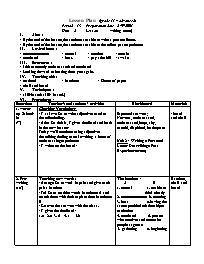Bài soạn môn học Tiếng Anh 11 - Period 13: Preparation - Unit: 2 Lesson: writing (cont)

I. Aims :
- By the end of the lesson, the students are able to write a personal letter.
- By the end of the lesson, the students are able to describe a past experience
II. Lexical items :
- commencement - mutual - reunion - remain
- confused - host. - pay a the bill - awake
III. Structures :
- I felt extremely embarrassed and confused
- Looking forward to hearing from you again.
IV. Teaching aids:
- textbook - handouts - Sheets of paper
- chalk and board
V. Techniques :
- skill-based ( skill- based.)
VI. Procedures :
Bạn đang xem tài liệu "Bài soạn môn học Tiếng Anh 11 - Period 13: Preparation - Unit: 2 Lesson: writing (cont)", để tải tài liệu gốc về máy bạn click vào nút DOWNLOAD ở trên
Lesson Plan (grade 11 – advanced) Period : 13 Preparation date : 24/9/2007 Unit : 2 Lesson : writing (cont) Aims : - By the end of the lesson, the students are able to write a personal letter. - By the end of the lesson, the students are able to describe a past experience Lexical items : - commencement - mutual - reunion - remain - confused - host. - pay a the bill - awake Structures : - I felt extremely embarrassed and confused - Looking forward to hearing from you again. Teaching aids: - textbook - handouts - Sheets of paper - chalk and board Techniques : - skill-based ( skill- based.) Procedures : State/time Teacher’s and students’ activities Blackboard Materials 1. warm-up & lead-in (7’) Checking Vocabulary - T ask two Sts to write adjectives used to describe feeling. - After Sts finish , T gives feedback and leads in the new lesson : Today we’ll continue using adjectives describing feeling to make writing a letter of embarrassing experience - T writes on the board : Expected answers; Nervous , embarrassed, embarrassed, inept, shy, careful, dispirited, inadequate Unit 2 : Writing a Personal Letter Describing a Past Experience (cont) - board and chalk 2. Pre- writing (10’) Teaching new words: - Arrange Sts to work in pairs and give each pair a handout - Tel Sts to read the words in column A and match them with their explanations in column B - Go over the answers with the class. - T gives the feedback : 1.c 2.e 3. d 4. a 5.b Question and answers: - T asks Sts to read the passage again and find answers to the questions. 1. What made him feel embarrassed? 2. why did it happen to him? 3. where did it happen/ 4. when did it happen to him? 5. who helped him solve the problem at last? - Tell Sts to compare answers in small groups and then over the answers with the class. The handout : A B 1. mutual a. unable to think clearly 2. commencement b. meeting 3. host c. having the same specified relationship to each other 4. confused d. person who receives and entertains people as guests 5. gathering e. beginning Expected answers : 1. He couldn’t find his money when he went to pay the bill. 2. Bc he had put the money in the pocket of another pair of pants 3. In a restaurant ( where he held a reunion dinner) 4. last weekend 5. his sister Handout, chalk and board - Chalk and board - textbook 3. while-writing (20’) Writing it yourself - T asks Sts to continue writing a letter to a friend, telling him / her about their most embarrassing experience based on the format given and the sample in Task a ( p30) ( if someone has finished a letter, he/she should write another ) - Go around to control and give help with vocabulary. - When they have finished, collect Sts’ writings to mark at home. Textbook 4. Post-writing (10’) Peer correction - Read a piece of Sts writings and ask Sts to give comments relating the format (steps), the language use, and the story. - Give feedback and comments. sheets of paper 5. Homework (1’) Reviewing vocabulary Ask Sts to review how to present components of a letter and learn the adjectives describing feeling. textbook
Tài liệu đính kèm:
 p13.doc
p13.doc





